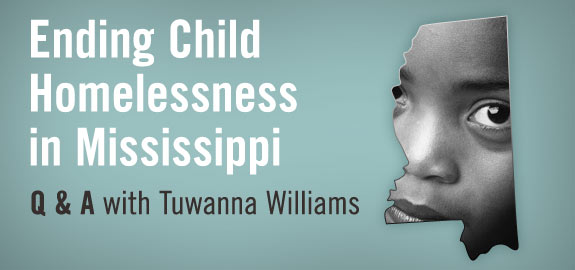Tuwanna Williams is the Mississippi State Coordinator for the Campaign to End Child Homeless
Ending child homelessness in America is an achievable yet challenging goal. In 2009, The National Center on Family Homelessness launched the Campaign to End Child Homelessness to raise awareness about the 1.5 million children in the U.S. who experience homelessness each year. According to America’s Youngest Outcasts, Mississippi ranked 41 out of 50 states for child homelessness, with more than 11,000 children experiencing homelessness each year. Tuwanna Williams, Mississippi State Coordinator, shares her insights from leading the state’s Campaign to End Child Homelessness.
Q: What are the goals of the Mississippi Campaign to End Child Homelessness?
The goals of the Mississippi Campaign are aligned with those of the national Campaign to End Child Homelessness. We work to prevent more than 11,000 children in Mississippi from experiencing homelessness each year. We are working to increase public awareness of the impact of homelessness on children and families. We are also improving programs and services to effectively meet the unique needs of children and families in Mississippi.
Q: Can you describe the major accomplishments of the Mississippi Campaign to End Child Homelessness?
Since joining the Mississippi Campaign in March 2010, I’ve learned a lot about the challenges and solutions for families experiencing homelessness in Mississippi. We recently conducted a listening tour of five cities in different regions of the state. We met community leaders who work with families experiencing homelessness on a day-to-day basis. They gave us in-depth knowledge and insights about the experience of family homelessness in Mississippi. I’ve also spoken with parents experiencing homelessness in communities throughout the state to get their ideas about the Campaign based on their experiences.
Q: What have you learned from meeting with parents who are experiencing homelessness?
Talking with parents experiencing homelessness has been eye opening. Homeless children experience high rates of trauma. Many families are also survivors of domestic violence, and must cope without a safe home or reliable transportation to get to work and school. They live with great stress and have little to fall back on. Many parents pointed to gaps in government support and childcare.
Q: Who are you working with in Mississippi to end child and family homelessness?
We formed a task force and an advisory board to advise and help implement the work of this important Campaign. We are also partnering with organizations that share our goal of ending child homelessness. As a result, our team includes shelter staff, social service providers, school districts, state government agencies, elected officials, and the religious community. We need everyone in the state to get involved to end child homelessness in Mississippi.
Q: What have you learned from talking to service providers who work with families experiencing homelessness?
I learned that many factors cause homelessness. These might include a lack of employment and educational opportunities for parents; the high cost of housing, food, health insurance, daycare, transportation, and other day-to-day necessities; and a lack of knowledge about available services. These compounding factors have resulted in more than 11,000 Mississippi children experiencing homelessness each year.
Q: What are the future plans for the Mississippi Campaign to End Child Homelessness?
I spent the summer reaching out to key stakeholders, officials, and community leaders to involve them in Campaign activities. We are currently drafting a Mississippi Plan to End Child Homelessness that will be released this fall. Once we release the Mississippi Plan, we will work hard to implement its recommendations to ensure that not one child goes one night without a home.
For more information about America’s Youngest Outcasts, the Campaign to End Child Homelessness and our work in Mississippi, please visit the Campaign to End Child Homelessness and National Center on Family Homelessness
ness. She shares what she has learned from partners and parents working to end homelessness for the 11,000 Mississippi children without homes.

